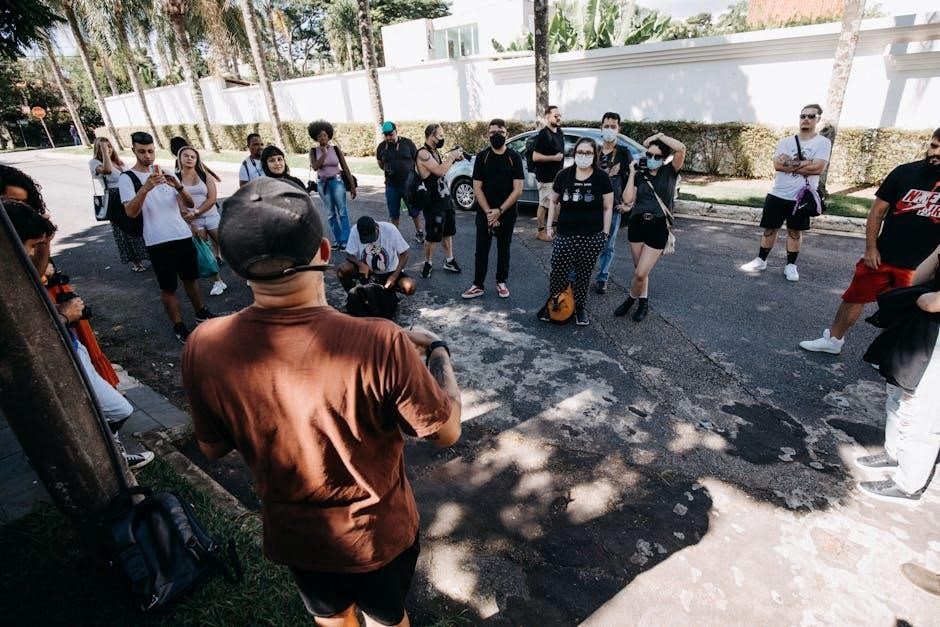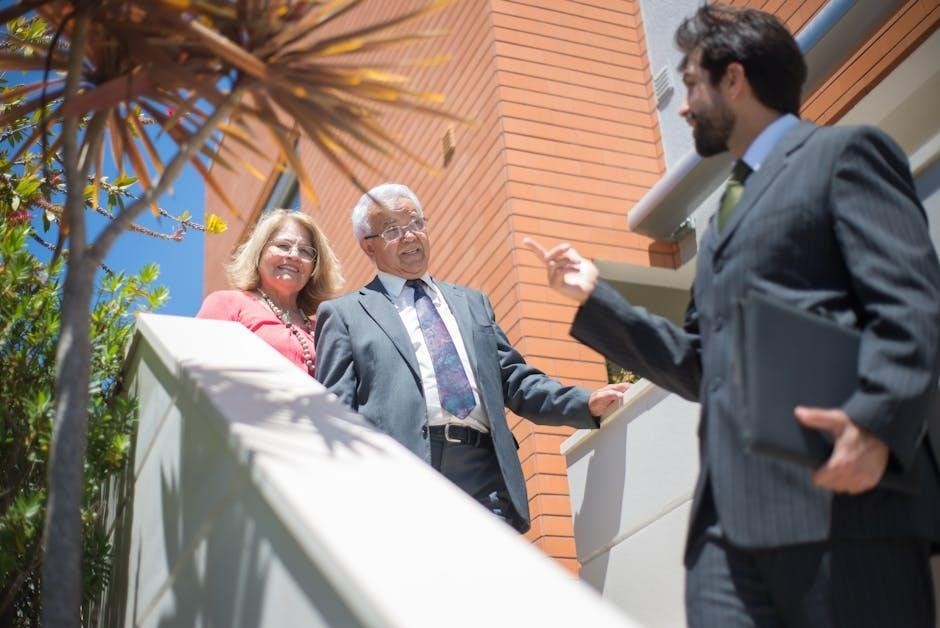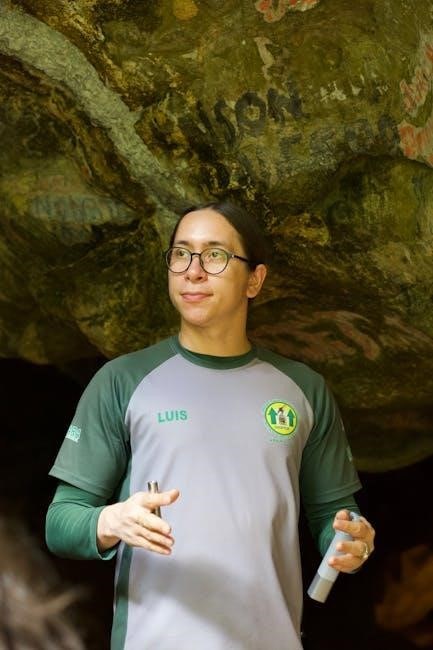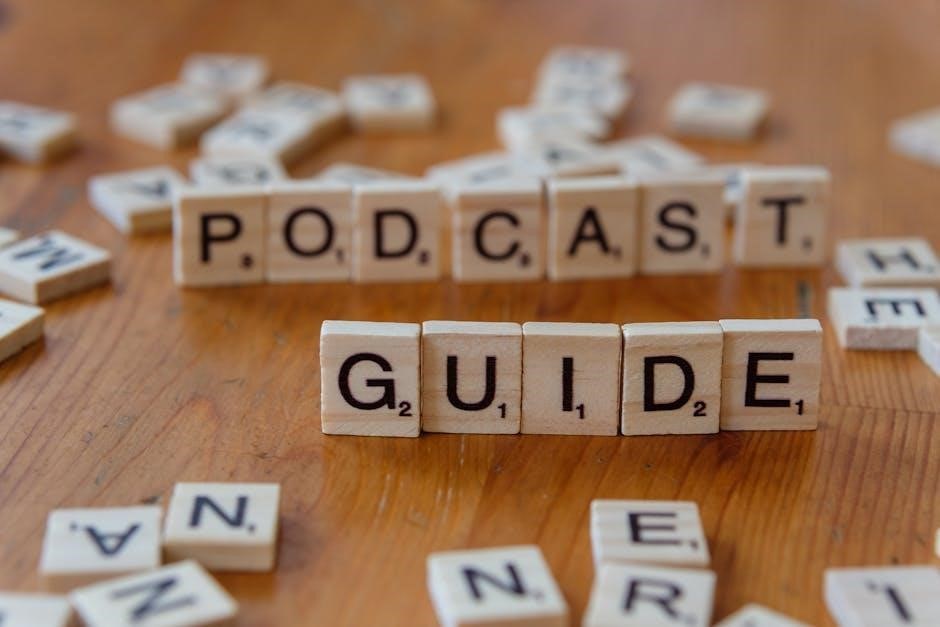A tour guide’s role goes beyond showcasing destinations; it requires mastering effective communication, deep local knowledge, and adaptability. These skills ensure memorable and enriching experiences for travelers.
1.1 Understanding the Role of a Tour Guide
A tour guide’s role extends beyond providing information; they are responsible for creating engaging, informative, and memorable experiences. They must handle logistics, ensure safety, and adapt to diverse group needs. Effective guides are storytellers, problem-solvers, and cultural ambassadors, balancing professionalism with approachability to make every tour unique and enjoyable for travelers.
1.2 Importance of Effective Communication
Effective communication is crucial for tour guides to convey information clearly and engagingly. It ensures travelers grasp key details, fostering a memorable experience. Clear speech, confident delivery, and active listening are essential. Guides must adapt their communication style to diverse audiences, using storytelling to make tours relatable and enjoyable. Strong communication builds rapport, resolves conflicts, and enhances overall satisfaction, making it a cornerstone of successful tours.
1.3 Key Skills for Successful Tour Guides
Successful tour guides possess a combination of leadership, organization, and cultural knowledge. They must be adaptable, able to think critically, and skilled in conflict resolution. Strong interpersonal skills and the ability to connect with diverse audiences are vital. Additionally, proficiency in time management, navigation, and safety protocols ensures smooth tours. These skills collectively enhance the quality of the experience, leaving a lasting positive impression on travelers.

Research and Preparation
Thorough research and preparation are vital for tour guides, ensuring they gather accurate destination information and create well-organized itineraries that meet travelers’ expectations and preferences effectively.
2.1 Gathering Information About the Destination
Gathering information about the destination is crucial for tour guides. It involves researching the historical background, key landmarks, cultural practices, and local events. Knowing transportation options, dining recommendations, and safety tips ensures a smooth experience. This comprehensive understanding allows tour guides to provide accurate, engaging, and personalized tours, enhancing travelers’ experiences and making their journey memorable.
2.2 Creating Engaging Itineraries
Creating engaging itineraries involves organizing schedules thoughtfully, balancing activities with downtime. Use tools like GPS and digital tour management systems to streamline logistics. Incorporate local insights and flexibility to cater to diverse interests. A well-planned itinerary ensures a smooth, enjoyable experience, enhancing traveler satisfaction and making tours memorable and hassle-free.
2.3 Understanding Local Culture and History
Understanding the local culture and history is crucial for tour guides to create authentic experiences. Researching historical sites, cultural practices, and traditions ensures accurate storytelling. This knowledge helps connect travelers with the destination’s essence, fostering deeper engagement and appreciation. It also allows guides to share meaningful insights, making tours more educational and memorable while promoting cultural preservation and respect.
Communication Techniques
Effective communication is vital for tour guides to engage and inform travelers. Clear speech, active listening, and adaptability ensure meaningful interactions, enhancing the overall tour experience for everyone.
3.1 Speaking Clearly and Confidently
Speaking clearly and confidently is essential for tour guides to convey information effectively. Enunciate words, maintain a steady pace, and project your voice to ensure all participants can hear; Confidence builds trust and engagement, while clear speech prevents misunderstandings. Adjust your tone and pitch to match the audience’s mood and environment. Practice your delivery to ensure key points are emphasized, making the tour informative and enjoyable for everyone involved.
3.2 Managing Diverse Audience Needs
Effective tour guides adapt to diverse audience needs by assessing age groups, languages, and mobility. Tailor explanations to engage all participants, ensuring clarity for non-native speakers. Be mindful of pacing for those with limited mobility. Encourage questions and cater to varied interests. Use visual aids and anecdotes to connect with different learning styles. Flexibility and attentiveness ensure an inclusive and enjoyable experience for everyone, fostering positive interactions and memorable tours.
3.4 Using Storytelling to Enhance Tours
Storytelling captivates audiences, making tours memorable and engaging. Share anecdotes, legends, and historical context to bring destinations to life. Use vivid descriptions and emotional connections to create relatable experiences. Highlight unique facts and cultural nuances to spark curiosity. Well-crafted stories not only educate but also entertain, fostering a deeper appreciation for the location. This approach transforms a mere sightseeing trip into a meaningful journey, leaving lasting impressions on travelers.

Safety and Emergency Preparedness
Identify potential risks, develop emergency plans, and ensure compliance with safety regulations. Conduct safety briefings and stay prepared to handle unexpected situations, ensuring traveler well-being and security always.
4.1 Identifying Potential Risks
Assessing potential hazards is crucial for tour guides. This includes evaluating terrain, weather conditions, and local crime rates. Guides must also consider health risks, such as contagious illnesses or allergic reactions. Conducting thorough safety briefings and staying informed about local conditions help minimize dangers. Being prepared for emergencies ensures the well-being of travelers and the smooth execution of the tour. Proactive risk identification is key to preventing incidents and ensuring a safe experience for all participants.
4.2 Developing Emergency Response Plans
Creating a detailed emergency response plan is essential for tour guides. This includes identifying evacuation routes, establishing communication protocols, and designating meeting points. Guides should also maintain first aid kits and know how to administer basic care. Regular drills and informing the group about procedures ensure preparedness. Having a well-structured plan allows guides to act swiftly during crises, minimizing risks and ensuring the safety of all participants. Effective communication and quick decision-making are critical components of any successful emergency response strategy.
4.3 Ensuring Compliance with Safety Regulations
Ensuring compliance with safety regulations is crucial for tour guides to protect both participants and themselves. Guides must stay informed about local laws, safety standards, and emergency protocols. Conducting thorough risk assessments and providing safety briefings are essential steps. Carrying proper safety equipment and adhering to health guidelines further enhance compliance. Regular training and updates on legal requirements help maintain a safe and responsible touring environment for all participants. Compliance ensures legal adherence and minimizes potential risks effectively.
Time Management and Logistics
Effective time management ensures smooth tour operations, while logistics coordinate schedules and resources. Guides must organize timelines, manage delays, and communicate clearly to maintain efficient and enjoyable experiences.
5.1 Organizing Tour Schedules
Organizing tour schedules requires meticulous planning to ensure a seamless experience. Create detailed itineraries, balancing activities to avoid rushing. Consider start and end points, travel times, and breaks. Flexibility is key to adapt to unexpected changes. Communicate schedules clearly to participants, ensuring everyone is informed and prepared. A well-structured plan enhances efficiency and satisfaction, making the tour enjoyable and stress-free for both guides and travelers.
5.2 Coordinating with Service Providers
Coordinating with service providers is essential for a smooth tour experience. Establish clear communication with vendors, negotiate discounts, and confirm reservations. Ensure all services align with the tour schedule and group needs. Regular updates and confirmations prevent misunderstandings. Building strong relationships with providers fosters trust and reliability, ensuring high-quality services for tourists. This collaboration enhances the overall tour experience and satisfaction for all participants.
5.3 Handling Unexpected Delays
Unexpected delays can disrupt even the best-planned tours. Stay calm and communicate clearly with the group, explaining the situation and estimated wait time. Have a backup plan, such as engaging activities or alternative routes, to keep the tour flowing smoothly. Regular updates and transparency build trust and patience. Flexibility and quick thinking are key to minimizing disruptions and ensuring a positive experience for all participants.

Adaptability and Problem-Solving
Adaptability and problem-solving are crucial for tour guides, ensuring smooth experiences amid unexpected challenges like weather changes or group dynamics. Quick thinking and creative solutions build trust and satisfaction.
6.1 Adjusting to Changing Conditions
Adaptability is key for tour guides, as they must respond to unpredictable situations like weather changes or last-minute cancellations. Flexibility ensures seamless experiences, requiring guides to think on their feet and make quick decisions. Monitoring conditions, having backup plans, and maintaining clear communication are essential. This approach not only safeguards safety but also enhances traveler satisfaction, turning potential disruptions into memorable moments through swift, creative solutions.
6.2 Resolving Conflicts During Tours
Conflicts during tours can arise due to diverse opinions or unexpected issues. Staying calm, actively listening, and addressing concerns with empathy are crucial. Clear communication helps clarify misunderstandings, while offering fair solutions maintains harmony. Tour guides should remain neutral, focus on group well-being, and swiftly resolve disputes to ensure a positive experience for all participants. Effective conflict resolution enhances trust and satisfaction, turning potential friction into shared understanding.
6.3 Improvising When Necessary
Improvisation is crucial when unexpected situations arise, such as weather changes or last-minute cancellations. Quick thinking and creativity enable tour guides to adapt seamlessly, ensuring the tour remains engaging. By staying calm and leveraging local knowledge, guides can transform challenges into unique opportunities. This skill not only rescues the experience but also enhances it, leaving tourists impressed by the guide’s resourcefulness and ability to think on their feet.

Technology and Tools for Tour Guides
Technology enhances tour guiding through GPS navigation, real-time updates, and digital management systems. Tools like apps and platforms streamline logistics, ensuring efficient and organized tours for optimal guest experiences.
7.1 Using GPS and Navigation Apps
GPS and navigation apps are essential tools for tour guides, ensuring accurate directions and real-time updates. These apps help guides optimize routes, avoid traffic, and locate points of interest efficiently. By using apps like Google Maps or specialized navigation tools, guides can provide seamless experiences, saving time and enhancing guest satisfaction. Real-time updates also enable quick adjustments to unforeseen changes, making tours more flexible and enjoyable for everyone involved.
7.2 Leveraging Social Media for Engagement
Social media is a powerful tool for tour guides to engage with audiences. Sharing real-time updates, behind-the-scenes insights, and stunning visuals captivates travelers. Platforms like Instagram and Facebook allow guides to build a personal brand, interact with customers, and promote tours. By encouraging guests to share their experiences, tours can gain organic publicity. Utilizing hashtags and geotags further increases visibility, helping to attract new clients and foster a sense of community around your tours.
7.3 Implementing Digital Tour Management Systems
Digital tour management systems streamline operations, enhancing efficiency and customer satisfaction. These tools allow guides to organize schedules, communicate with groups, and track bookings. Features like real-time updates, payment processing, and feedback collection simplify logistics. By integrating these systems, tour guides can focus on delivering exceptional experiences while maintaining seamless coordination and improving overall service quality for travelers.

Marketing Yourself as a Tour Guide
Effective marketing involves building a personal brand, leveraging social media, and creating engaging content to attract clients and promote tours online.
8.1 Building a Personal Brand
Building a personal brand as a tour guide involves creating a unique identity that reflects your expertise and passion. Use keywords like “tour guide” or “travel expert” in your online profiles and marketing materials. Optimize your website and social media with relevant search terms to improve visibility in Google search results. Share engaging content, such as travel tips or behind-the-scenes stories, to attract potential clients. Consistency and authenticity are key to establishing trust and attracting loyal customers. Leverage reviews and testimonials to showcase your reliability and professionalism. By clearly defining your niche and values, you can stand out in a competitive market and build a loyal client base. Regularly update your online presence to stay relevant and engaging, ensuring your brand resonates with your target audience. This strategic approach will help you grow your reputation and attract more travelers seeking guided tours.
8.2 Creating Compelling Marketing Materials
Developing captivating marketing materials is crucial for attracting potential clients. Use high-quality images and engaging content that highlights your tours’ unique aspects. Incorporate storytelling to convey memorable experiences. Ensure your materials are visually consistent, with a clear brand identity. Include customer testimonials to build credibility. Optimize your content with relevant keywords for better search visibility. Provide clear calls to action, guiding potential customers on how to book or learn more. Regularly update your materials to reflect current trends and offerings, ensuring they remain fresh and appealing to your target audience. By focusing on these elements, you can create marketing materials that effectively showcase your tours and attract travelers seeking unforgettable experiences.
8.3 Utilizing Online Platforms for Promotion
Leverage online platforms to maximize your reach as a tour guide. Use social media, travel blogs, and review sites to showcase your tours. Share high-quality images and videos to captivate potential clients. Engage with your audience by responding to comments and messages promptly. Utilize SEO techniques to ensure your content appears in search results. Collaborate with influencers or travel bloggers to expand your visibility. Regularly update your profiles with fresh content to keep your audience engaged and informed about your services. This strategic use of online platforms can significantly boost your tour guide business’s visibility and attract more travelers.

Building Relationships with Local Businesses
Building strong relationships with local businesses fosters collaboration, offering mutual benefits and support for both parties, enhancing the overall experience for tourists while promoting the local economy.
9.1 Partnering with Local Restaurants and Shops
Collaborating with local restaurants and shops creates a win-win situation, offering tourists authentic experiences while boosting local businesses. Partnerships can include exclusive deals, special menus, or joint promotions. Building trust and loyalty with these establishments ensures consistent quality and enhances visitor satisfaction. Such alliances not only support the local economy but also provide tour guides with reliable, high-quality options to offer their groups, fostering positive feedback and repeat business.
9.2 Negotiating Discounts for Tour Groups
Negotiating discounts with local businesses is crucial for enhancing the value of your tours. By building strong relationships with vendors, you can secure special rates for your groups, ensuring cost-effective experiences. Offer to promote their establishments in exchange for discounts, creating a mutually beneficial arrangement. This not only attracts more customers for the businesses but also strengthens your reputation as a resourceful and customer-focused tour guide, leading to higher satisfaction and repeat clients.
9;3 Maintaining Positive Vendor Relationships
Maintaining positive relationships with vendors is essential for a tour guide’s success. Building trust and reliability ensures long-term partnerships. Communicate openly about your needs and expectations, while respecting their business practices. Show appreciation for their support and collaborate to create mutually beneficial opportunities. Regular interactions and feedback foster a strong, respectful connection, ensuring a smooth and enjoyable experience for both vendors and tour participants.
Continuous Learning and Improvement
Tour guides must continuously update their knowledge and skills to stay relevant. Seek feedback, attend workshops, and stay informed about local developments to enhance your expertise and deliver exceptional tours.
10.1 Staying Updated on Local Developments
Staying informed about local developments is crucial for tour guides. Follow local news, subscribe to community newsletters, and engage with local networks to stay updated on new attractions, events, and changes. Leveraging online platforms and tourism boards can provide valuable insights. Regularly updating your knowledge ensures your tours remain relevant and engaging, offering visitors the most current and accurate information about their destination.
10.2 Seeking Feedback from Tour Participants
Seeking feedback from tour participants is essential for growth. Encourage open communication, ask questions, and listen actively to their experiences. Positive feedback reinforces strengths, while constructive criticism highlights areas for improvement. Use this valuable insight to refine your tours, ensuring they meet visitor expectations. Regularly acting on feedback enhances the quality of your tours and builds a strong professional reputation. It’s a key part of continuous improvement in tour guiding.
10.3 Attending Workshops and Training Sessions
Attending workshops and training sessions is crucial for professional growth. These programs offer insights into new techniques, industry trends, and best practices. They provide opportunities to network with fellow guides and experts, enhancing knowledge and skills. Workshops often cover topics like communication, cultural sensitivity, and safety protocols. Regular participation ensures tour guides stay updated and deliver high-quality, engaging experiences, maintaining their reputation as knowledgeable and effective professionals in the tourism industry.
Legal and Ethical Considerations
Understanding local laws, maintaining professional ethics, and ensuring environmental sustainability are vital. Tour guides must respect cultural norms and minimize ecological impact, fostering responsible tourism practices worldwide;
11.1 Understanding Local Laws and Regulations
Understanding local laws and regulations is crucial for tour guides to ensure compliance and avoid legal issues. This includes knowledge of permits, health codes, and restricted areas. Familiarity with cultural norms and environmental rules is also essential. Guides must stay updated on legal changes to provide safe and lawful experiences. Compliance builds trust with authorities and enhances credibility with tourists, minimizing risks and ensuring smooth operations during tours.
11.2 Maintaining Professional Ethics
Maintaining professional ethics is vital for tour guides to build trust and credibility. This involves honesty, integrity, and respect for diverse cultures and environments. Guides should avoid misleading information and ensure accurate representations of destinations. Upholding ethical standards fosters positive relationships with tourists, local businesses, and communities. Adhering to a code of conduct ensures responsible tourism and supports the long-term sustainability of the industry. Professional ethics are non-negotiable for a reputable and successful tour guiding career.
11.3 Ensuring Environmental Sustainability
Ensuring environmental sustainability is a critical responsibility for tour guides. This involves promoting eco-friendly practices, such as reducing waste and carbon footprints. Guides should encourage tourists to respect wildlife and natural habitats while adhering to local environmental regulations. By fostering sustainable tourism, guides help preserve destinations for future generations. Educating visitors about the importance of conservation and supporting eco-conscious businesses further enhances the positive impact of tourism on the environment and local communities;

Career Development for Tour Guides
Advancing your career as a tour guide involves continuous learning, networking, and adapting to industry trends. Pursuing certifications and specialized knowledge can open doors to leadership roles and new opportunities.
12.1 Advancing to Specialized Tours
Advancing to specialized tours requires developing deep expertise in niche areas like historical, food, or adventure tours. This involves extensive research, certifications, and networking with experts to gain unique insights. Specialized tours attract dedicated clients seeking in-depth experiences, allowing guides to charge premium rates. Staying updated on trends and continuously refining knowledge ensures long-term success and credibility in the competitive tourism industry.
12.2 Expanding to New Destinations
Expanding to new destinations involves thorough research and planning. Identify emerging travel hotspots and assess demand. Understand local cultures, regulations, and logistics to create authentic experiences. Build relationships with local businesses to offer unique tours. Stay updated on travel trends and adapt to changing consumer preferences. Expanding your reach attracts diverse clientele and enhances your reputation as a versatile tour guide, opening doors to new revenue streams and growth opportunities.
12.3 Pursuing Leadership Roles in Tourism
Pursuing leadership roles in tourism involves gaining experience, developing strategic skills, and networking within the industry. Aspiring leaders should seek mentorship and advanced training to refine their expertise. Building a strong reputation through innovative tour concepts and exceptional customer service can elevate your profile. Leadership roles often involve managing teams, driving industry innovation, and advocating for sustainable tourism practices, ultimately shaping the future of the travel industry and inspiring others to follow in your footsteps.
